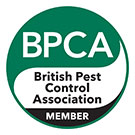GOT PEST PROBLEMS, GET IN TOUCH FOR A FREE QUOTE
- Telephone0141 432 0433
- Emailinfo@allpestservices.co.uk
- REQUEST A CALLBACK
The House Mouse [Mus domestica] is very common in most areas of the UK and prefers to live indoors although it may live outdoors part or all of the year.
It is sometimes confused with 3 other species: the Field Mouse [Apodemus sylvaticus], the Yellow Necked Field Mouse [Apodemus flavicollis] and the Harvest Mouse [Micromys minutus].
House Mice grow to approx. 100mm, taking as little as 35 days to reach maturity. Lifespan is approx. 9-18 months but can be much longer (sometimes several years).
The female has up to 8 litters in her lifetime with an average litter size of 6 and can give birth as frequeently as every 24-28 days. In optimal conditions (usually found indoors) mice can breed throughout the year.
Mice can squeeze through gaps as small as 6mm in diameter, they are excellent climbers and can run along pipes, ropes and wires. They have been known to cause fires by gnawing on electric cables and can cause significant damage to pipes and building fabric.
Although they pose less of a danger than rats from disease they are still a significant hazard in the transmission of some food-borne illnesses and pathogenic bacteria (such as Salmonella, Campylobacter-Entiritis and Shigella (Dysentery).
Like rats their droppings and fur poses a significant hazard of contamination of food products and food preparation and storage areas. Because they are incontinent they also urinate everywhere they go.
Do you have a problem with mice? We can help…
Our staff have been specifically trained to undertake all types of insect control work and have many years experience in the profession. All our staff have achieved the Royal Society for Public Health Level 2 Award in Pest Management which is a requirement for members of the BPCA. All our staff also have specific qualifications in Insect Control and the Safe Use of Pesticides and are Wildlife Aware accredited.
For some properties where there is a high risk of repeated infestation or because of the severe consequences of infestation a regular inspection and maintenance programme is recommended. This particularly applies to food retailers or manufacturers where infestation could lead to prosecution, fines or even closure, not to mention a lot of bad publicity. For this reason the vast majority of supermarkets, food shops, cafes and restaurants have a regular preventative maintenance service. All Pest Services can provide a free site survey to establish requirements and offer a bespoke tailor-made service.
Causing harm to any species, whether insect or otherwise, is a last resort. Users of pesticides must first determine whether or not it is practicable to control the infestation without using a chemical – in many cases it is not but other techniques are available and should be considered, particularly trapping and pest- proofing. Despite the popular and widely held belief to the contrary there are few properties that cannot be made vermin-proof, especially detached properties, whatever their age – however it is a skilled technique that few pest control operatives excel at. All Pest Services specialise in this field and can carry out vermin proofing of anything from an individual flat up to a mansion or factory.
Our staff have been specifically trained to undertake all types of insect control work and have many years experience in the profession. All our staff have achieved the Royal Society for Public Health Level 2 Award in Pest Management which is a requirement for members of the BPCA. All our staff also have specific qualifications in Insect Control and the Safe Use of Pesticides and are Wildlife Aware accredited.
For some properties where there is a high risk of repeated infestation or because of the severe consequences of infestation a regular inspection and maintenance programme is recommended. This particularly applies to food retailers or manufacturers where infestation could lead to prosecution, fines or even closure, not to mention a lot of bad publicity. For this reason the vast majority of supermarkets, food shops, cafes and restaurants have a regular preventative maintenance service. All Pest Services can provide a free site survey to establish requirements and offer a bespoke tailor-made service.
Causing harm to any species, whether insect or otherwise, is a last resort. Users of pesticides must first determine whether or not it is practicable to control the infestation without using a chemical – in many cases it is not but other techniques are available and should be considered, particularly trapping and pest- proofing. Despite the popular and widely held belief to the contrary there are few properties that cannot be made vermin-proof, especially detached properties, whatever their age – however it is a skilled technique that few pest control operatives excel at. All Pest Services specialise in this field and can carry out vermin proofing of anything from an individual flat up to a mansion or factory.
Apart from the obvious situation where they are seen, their presence can be determined most easily by the presence of droppings. This is particularly true for mice where the droppings tend to be scattered. Rats often leave their droppings in a pile so these may not necessarily be seen. In addition the presence of mice and rats is often heard before there are any obvious visible signs or they may betray their presence due to damage to foodstuffs or other materials. A skilled pest control technician may also be able to identify smear marks, urine pillars, rodent hairs or minor rodent gnaw or scratch marks.
Rats and mice can cause significant problems, such as damage to pipes and wires (including causing fires), damage and contamination of food, spread of disease (such as Weil’s disease, salmonella, foot and mouth, typhoid and dysentery, lymphatic meningitis etc.). In addition they can cause structural damage to timbers and distress and alarm.
GOT PEST PROBLEMS, GET IN TOUCH FOR A FREE QUOTE










